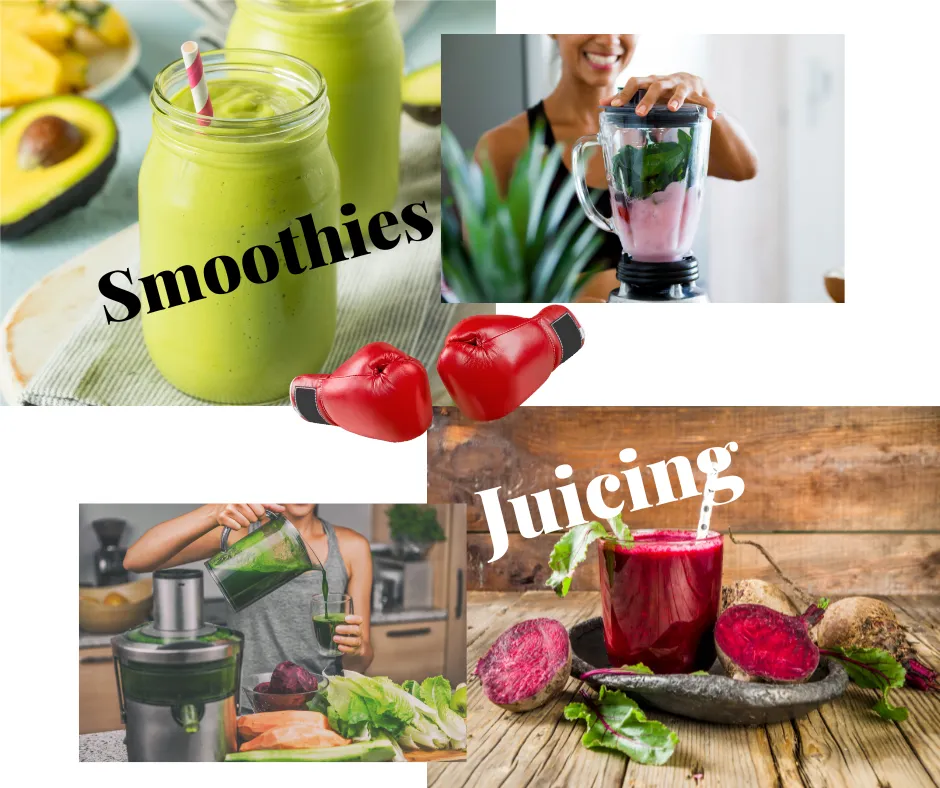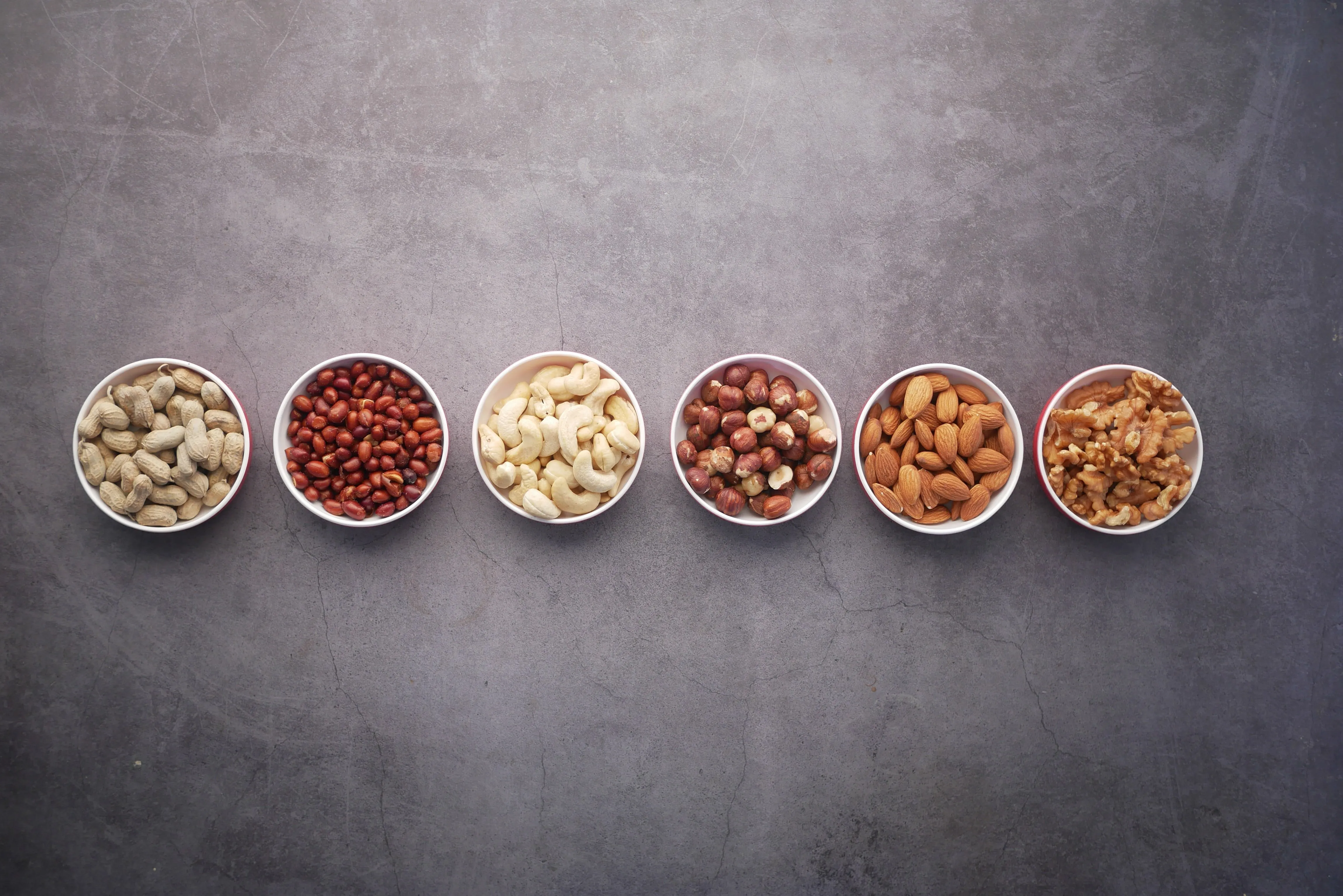The Age-Old Smoothies vs Juicing Debate
I use the word debate in jest, because there really isn’t a valid reason to debate over smoothies vs juicing. The way I look at it, both are an excellent way to introduce healthier options into your eating regimen. In the realm of health-conscious beverage choices, smoothies and juices stand out as popular options. Both offer a convenient and delicious way to incorporate fruits, vegetables, and other nutritious ingredients into your diet.
However, when it comes to determining which is better, the answer isn't necessarily straightforward. The decision between smoothies and juicing often boils down to individual health goals and preferences. Let's delve into the characteristics, benefits, and drawbacks of each to help you make an informed choice.

Smoothies: The Wholesome Blend
Smoothies are a concoction made by blending whole fruits and vegetables along with other ingredients like probiotic yogurt, nut milks, or protein powders.
Here is why a smoothie might be the right choice for you...
5 Benefits of Smoothies:
- Fiber-Rich: Unlike juices, smoothies retain the fiber content of fruits and vegetables, promoting better digestion, and providing a feeling of fullness.
- Regular Bowel Movements: Another part of the digestive process is the elimination of your foods. The fiber in smoothies keeps your bowel movements regular.
- Sustained Energy: The presence of fiber slows down the release of sugars into your bloodstream, which helps to prevent sudden spikes and crashes in energy levels.
- Customizable Nutrition: Smoothies give you the freedom to add various nutritious ingredients like leafy greens, fruits, nuts, seeds, and superfoods to tailor your smoothie to your specific health needs.
- Meal Replacement: With the addition of proteins and healthy fats, smoothies can serve as a satisfying meal replacement option, especially for those with busy lifestyles.
Here is what’s not so great about smoothies...
5 Drawbacks of Smoothies:
- Caloric Content: Depending on the ingredients used, smoothies can be calorie-dense, which might not align with weight loss goals if portion sizes aren't carefully monitored.
- Added Sugars: Many restaurant or store-bought smoothies contain added sugars in the form of sweetened fruit juices, flavored yogurts, or syrups. Even your homemade smoothies can become sugar-laden if excessive amounts of sweet fruits or sweeteners like honey or agave are used. This can contribute to weight gain, increased risk of chronic diseases like type 2 diabetes, and can negatively impact overall health.
- Texture Preference: Some people may not enjoy the thick texture of smoothies, especially if they contain fibrous ingredients like kale or spinach.
- Potential Nutrient Loss: While blending fruits and vegetables makes them easier to consume, it can also lead to some nutrient loss. Exposure to oxygen from the centrifugal force of the blender can degrade certain heat-sensitive vitamins and phytonutrients, such as vitamin C and some antioxidants.
- Preparation Time: Compared to juices, preparing a smoothie might require more time because of all the chopping, blending, and cleaning.
Juicing: Liquid Nutrition
Juicing involves extracting the liquid content from fruits and vegetables, leaving behind the fiber-rich pulp and drinking only a very concentrated liquid form of nutrition.
Here is why it might be the preferred choice for certain health goals...
5 Benefits of Juicing:
- Nutrient Absorption: Juices provide a concentrated source of vitamins, minerals, and antioxidants, which are quickly absorbed into the bloodstream, offering a burst of nutrition.
- Digestive Rest: By removing the fiber, juicing gives the digestive system a much-needed break, allowing the body to focus on absorbing nutrients rather than breaking down fiber.
- Hydration: Juices are an excellent way to stay hydrated, especially for those who struggle to drink enough water throughout the day.
- Detoxification: Some proponents believe that juicing can aid in detoxifying the body by flushing out toxins and promoting cellular repair.
- Convenience: With high-quality juicers, you can toss the whole fruit or vegetable (washed, of course) into the machine. This offers lots of convenience when your busy lifestyle may not allow time to prepare and eat whole foods. This also means you are conveniently meeting daily fluid intake goals, especially for those who struggle to drink plain water.
Here is what’s not so great about juicing...
5 Drawbacks of Juicing:
- Reduced Fiber: The absence of fiber in juices can lead to faster digestion and absorption of sugars, potentially causing blood sugar spikes, especially with fruit juices.
- Less Satiety: Without fiber to promote fullness, juices may not be as filling as smoothies, leading to increased hunger and potential overconsumption of calories.
- Limited Protein and Healthy Fats: Juices primarily consist of carbohydrates from fruits and vegetables and lack significant amounts of protein and healthy fats, which are essential for overall health and satiety.
- Expense: If you don’t have a juicer, purchasing cold-pressed and other juices from a restaurant or store can be quite expensive. While purchasing a quality juicer may seem out of reach according to your budget, you can find “knock-off” juicers for under $200 that are decent. Whether a cheap one or a super-nice high-priced one, the investment will be well worth it for the healthy results you will reap.
- Produce Waste: Juicing often produces a significant amount of pulp, which may contribute to food waste unless repurposed in other recipes. (I’ve learned to make several nutritious and tasty dishes from my extracted pulp.)
Conclusion:
Ultimately, whether you choose smoothies or juicing depends on your health goals, preferences, and lifestyle. If you prioritize fiber intake, sustained energy, and customizable nutrition, smoothies may be the better option for you. On the other hand, if you seek a concentrated source of vitamins, hydration, and digestive rest for important periodic detoxification, juicing might align more with your objectives.
Regardless of your choice, both smoothies and juices can be valuable additions to a balanced diet when consumed in moderation and as part of an overall healthy eating pattern. Experiment with different recipes, listen to your body, and enjoy the journey to better health, one sip at a time.








